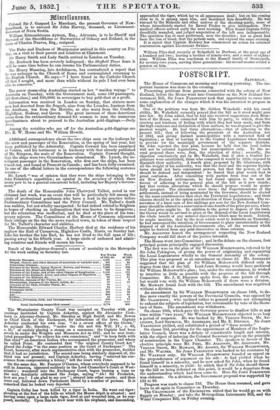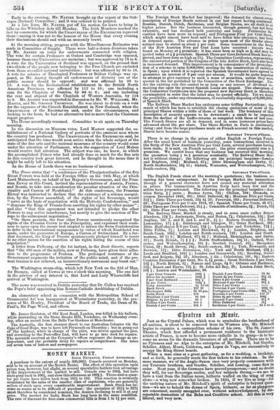POSTSCRIPT.
SATURDAY.
Presenting petitions from persons connected with the colony of New Zealand, before the House went into Committee on the New Zealand Go- vernment Bill, Sir Joule PAKINOTON took that opportunity to enter into some explanation of the changes which it was his intention to propose in the bill.
One of the petitions was from Mr. Gibbon Wakefield : with his usual
ability, Mr. Wakefield earnestly prayed that the bill as it stood might pass into law. Sir John added, that he had also received suggestions from Mem- bers of the House, not connected with him by party, to which, from the courtesy and kindness of feeling with which they had been made, and from the high eminence and distinction of their authors, he was disposed to give the greatest weight. He had three alternatives,—that of adhering to the present bill ; that of following the precedent of the Australian Act of 1842, and giving distinct municipalities with a restricted field of legislation ; or that of leaving it to the Central Legislature when formed to provide for the municipal government of the separate districts. Sir John rejected the first plan, because he held that the local bodies will not be colonial legislatures, but municipalities only. To the se- cond proposal there were, first, the objection of delay; secondly, the objection conclusively put by Mr. Wakefield, that if once a Central IA- ture were established, those who composed it would be little disposed to diminish their authority. A fourth plan, proposed by Mr. Gladstone, with all the weight of his authority, was that the local and the supreme legisla- tures should not have concurrent powers, but that the powers of each should be defined and independent : he feared that plan would lead to great confusion. After consulting with parties from four out of the six New Zealand settlements, he had found opinion to be most in favour of adhering to the general plan of the bill as it now stands ; but that certain alterations which he should propose would be grate- fully accepted. The alterations were these : the Superintendents of the settlements, instead of being nominated by the Governor, should be elected by the same constituencies that elect the Provincial Legislatures ; and their salaries should be at the option and discretion of those Legislatures. The re- servation of a fixed sum of five shillings per acre for the New Zealand Com- pany should be altered to a reservation a one-fourth of the price per acre, what- ever that price might be. In addition to the power to dispose of the land, the Crown would be advised to place at the disposal of the Local Legislatures the whole benefit of any mineral discoveries which may be made. Indeed, he might mention, that by the mail which went to Australia on Thursday, he had announced the intention of Government to place unrestrictedly at the disposal of all the Australian Governments also, all the revenues which might be derived from any gold-discoveries in those colonies. Mr. AGLIONBY feared the arrangement respecting the New Zealand Company would fall short of the justice intended.
The House went into Committee; and hrthe debate on the clauses, four principal points principally engaged discussion.
The first was on the plan of Sir Wirsaszt Mormswonzn, referred to by Sir John Pakington, of giving the power of originating and organizing the Local Legislatures wholly to the General Assembly of the colony. This plan was proposed as an amendment on clause 2d. Mr. .ADDERLEY suggested that the plan of Sir William Molesworth differed only in degree from that of the bill. Lord JOHN RUSSELL would have preferred Sir William Molesworth's plan; but, under the circumstances, he wished to interfere as little as possible with the progress of the bill through Committee. Mr. J. E. DENISON spoke from the same points of view, but would vote with Sir William Molesworth if there were a division. Mr. Mowerr found fault with the bill. The amendment was negatived without a division.
An amendment by Sir Wiliam& MOLESWORTH on clause 18th, to de- fine more exactly the powers of the Provincial Councils, was opposed by Mr. GLensmien ; who inclined rather to general powers not attempting to exhaust the subjects of legislation, but restrainable by veto of the Secre- tary of State. The amendment was withdrawn. On clause 29th, which gave the Governor power to disallow bills at any time within "two years," Sir WIT Liku MOLTAWORTH objected to so long a period of suspense. He was backed by Mr. VERNON Same, Mr. AG- LIONEY, Lord Sintztoun, Mr. Annznize, and Mr. E. Dzersorr. Sir Jour; PAKINOTON yielded, and substituted a period of "three months." On clause 33d, providing for the appointment of Members of the Legis- lative Council, there was a debate of considerable length and interest, with the object of inducing the Colonial Secretary to give up the principle of nomineeurm in the Upper Chamber. The speakers in favour of the elective principle were Mr. PEEL, Mr. AGLIONBY, Mr. ADDERLET, Mr. VERNON SMITH, Mr. MOWATT, Mr. AMITE; Sir WILLLAM MOLESWORTH, and Mr. Wz.raz.a. Sir Rom PairmoTorr was backed in his resistance by Mr. WeLromi only. Sir Wri.tzsm MoLesworim founded an appeal on the preponderance of argument on his side : he had yielded when he found himself in a minority, and he now asked Sir John, when he found himself in a minority, to yield : he added, that if Sir John should throw up the bill on being defeated on this point, it would be a departure from the understanding which had been come to. Hero Sir JOHN PAXINGTON was obdurate. On a division, the Government proposal was supported by 132 to 89. Progress was made to clause 73d. The House then resumed, and gave leave to sit again in Committee on Thursday. The Caszeczuon of the Exenzormn stated that he would go on with Supply on Monday; and take the Metropolitan Interments Bill, and the Water Companies Bill, on Friday evening.
Early in the evening, Mr. NAP7ER brought up the report of the Out- rages (Ireland) Committee ; and it was ordered to be printed. At a late hour, Mr. NAPnut put off his motion for leave to bring in bills on the Whiteboy Acts till Monday. The Irish Members marked the fact by comments, for which the thiefccuamon of the Exonnuorm reproved them—saying it was not to the honour of the House that every evening their discussions should end with an unseemly brawL
At the morning sitting, progress with the Miscellaneous Estimates was made in Committee of Supply. There were half-a-dozen divisions taken by Mr. ANSTET OD votes for endowments connected with religion.
The vote for certain Professors at Oxford and Cambridge was opposed, because these two Universities are sectarian ; but was approved by 78 to 8.
A vote for the Universities of Scotland was opposed, on the ground that two-thirds of the people now belonging to the Free Church are excluded from those so-called national.universities ; but was affirmed by 86 to 16.
A vote for salaries of Theological Professore at Belfast College was op- posed, as Mr. Anstey thought all endowments of divinity out of the public money should be opposed ; and was affirmed by 90 to 13. A vote for the Ecclesiastical establishment in the British North American Provinces was affirmed by 112 to 10; one including a sum for the Chaplain of Gambia, by 94 to 6; and one including the rent and stipend of the Chaplain of Western Australia, by 114
to 9. Mr. ANSTET was supported in dismission by Mr. W. Wirmiessei Mr. HASTIE, and Mr. GEORGE THOMPSON. He was about to divide on a vote for the expenses of the Church Establishment in New Zealand, when the CHANCELLOR of the Exeunt:117BR said, under the circumstances, and looking to the hour, he had no alternative but to move that the Chairman report progress.
The House accordingly resumed. Committee to sit again on Thursday morning.
In the discussion on Museum votes, Lord Manor( suggested the es- tablishment of a National Gallery of portraits of the eminent men whom
the country has produced. The CHANCELLOR of the ExCREQUER said, he
anticipated that the time would soon arrive when the whole subject of the state of the fine arts and the national museums of the country would come under the attention of Parliament, when the suggestion of Lord Mahon would receive full attention. The subject was one, he knew, in which the accomplished Prince who had already done so much for the fine arts in this country took great interest, and he thought in the mean time it Might be safely left to his attention.
In the House of Lords there was no business of interest.



























 Previous page
Previous page